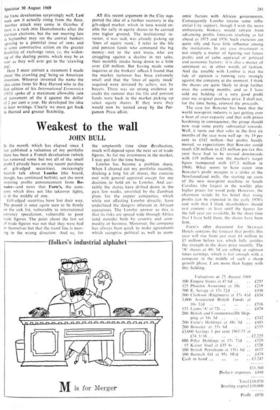Weakest to the wall
JOHN BULL
In the month which has elapsed since I last published a valuation of my portfolio there has been a French devaluation (which has removed some but not all of the small profit I already have on my recent purchase of gilt-edged securities), increasingly bearish talk about Lonrho (the board, though, has continued bullish), not the most inspiring profits announcement from Bo- water—and news that Forte's, the com- pany which does not like takeover fights, is in the middle of one.
Gilt-edged securities have lost their way. The pound is once again seen to be firmly on the sick list, vulnerable to international currency speculation, vulnerable to poor trade figures. The point about the last set of trade figures was not that they were bad in themselves but that the trend line is mov- ing in the wrong direction. And so, for the umpteenth time since 'devaluation, much will depend upon the next set of trade figures. As for my investment in the market, I stay put for the time being.
Lonrho has become a problem share. When I cleaned out my portfolio recently, ditching a long list of shares, the exercise met with general approval except for my decision to hold on to Lonrho. And cer- tainly the shares have drifted down in the past few weeks, unsettled by the Zambian plans for the copper companies, which while not affecting Lonrho directly, have underlined the dangers inherent in African operations. The Lonrho answer to this is that its risks are spread wide through Africa (and outside) both by country and com- modity or business. Moreover, the company has always been quick to make agreements which recognise political as well as econ-
ffolkes's industrial alphabet
Mis for Merger
omic factors with African governments. Consequently Lonrho retains some influ- ential City support, though I wish the more enthusiastic brokers would refrain from advancing profits forecasts reaching as far ahead as 1975 and 1976. Such exercises are quite silly and have little influence among the institutions. In any case investment is not simply a matter of figuring out future profits and of calm appraisal of political and economic factors: it is also a matter of sentiment or, in other words, of fashion. And the trouble with Lonhro is that the tide of opinion is running very strongly against the company at the moment. I think the shares are quite likely to drop further over the coming months, and so I have sold my holding—at a very good profit over my original purchase price. I shall not, for the time being, reinvest the proceeds.
The case for Bowater has been that the world newsprint industry is just getting over a bout of over-capacity and that with prices hardening in consequence, the group should now reap some pretty substantial rewards. Well, it turns out that sales in the first six months of the year were well up—by 19 per cent to £142 million—but profits hardly moved, so expectations that Bowater could reach £20 million to £21 million pre-tax this year have had to be revised downwards with £19 million now the market's target figure (compared with £17.3 million in 1968). What seems to have eaten into Bowater's profit margins is a strike at the Newfoundland mills, the starting up costs of the new newsprint machine in South Carolina (the largest in the world), plus higher prices for wood pulp. However, the chairman stands by his belief that rising profits can be expected in the early 1970's and with that I think shareholders should rest content—at least until the figures for the full year are available. In the short time that I have held them, the shares have been firm.
Forte's offer document for Skyways Hotels contains the forecast that profits this year will rise from just over £4 million to £5 million before tax, which fully justifies the strength in the share price recently. The 'A' shares at 48s 3d are selling at eighteen times earnings, which is fair enough with a company in the middle of such a sharp growth phase. I am more than happy with this holding.
Valuations at 25 August 1969 100 Empire Stores at 47 6d .. £237 125 Phoenix Assurance at 35s £219 500 E. Scragg at 17s 2}d £430 500 Clarkson (Engineers) at 17s 44-d £434 1,000 Associated British Foods at lOs 34d £516 133 Lyons 'A' at 72s £479 200 British and Commonwealth Ship- ping at 34s 3d £342 200 Forte's Holdings at 48s 3d £483 200 Bowater at 55s 6d £555 £3,000 Savings 3 per cent 1965-75 at £74 3/16 £2,225 600 Pillar Holdings at 17s 74d .. £529 15 Kaiser Steel at £35 4s £528 100 British Petroleum at 131s 6d .. £657 100 Burmah Oil at 95s 10Id f479 Cash in hand £3,247 £11,360
Deduct: expenses £490
Total £10,870 Starting capital £10,000 Profit £870


































 Previous page
Previous page